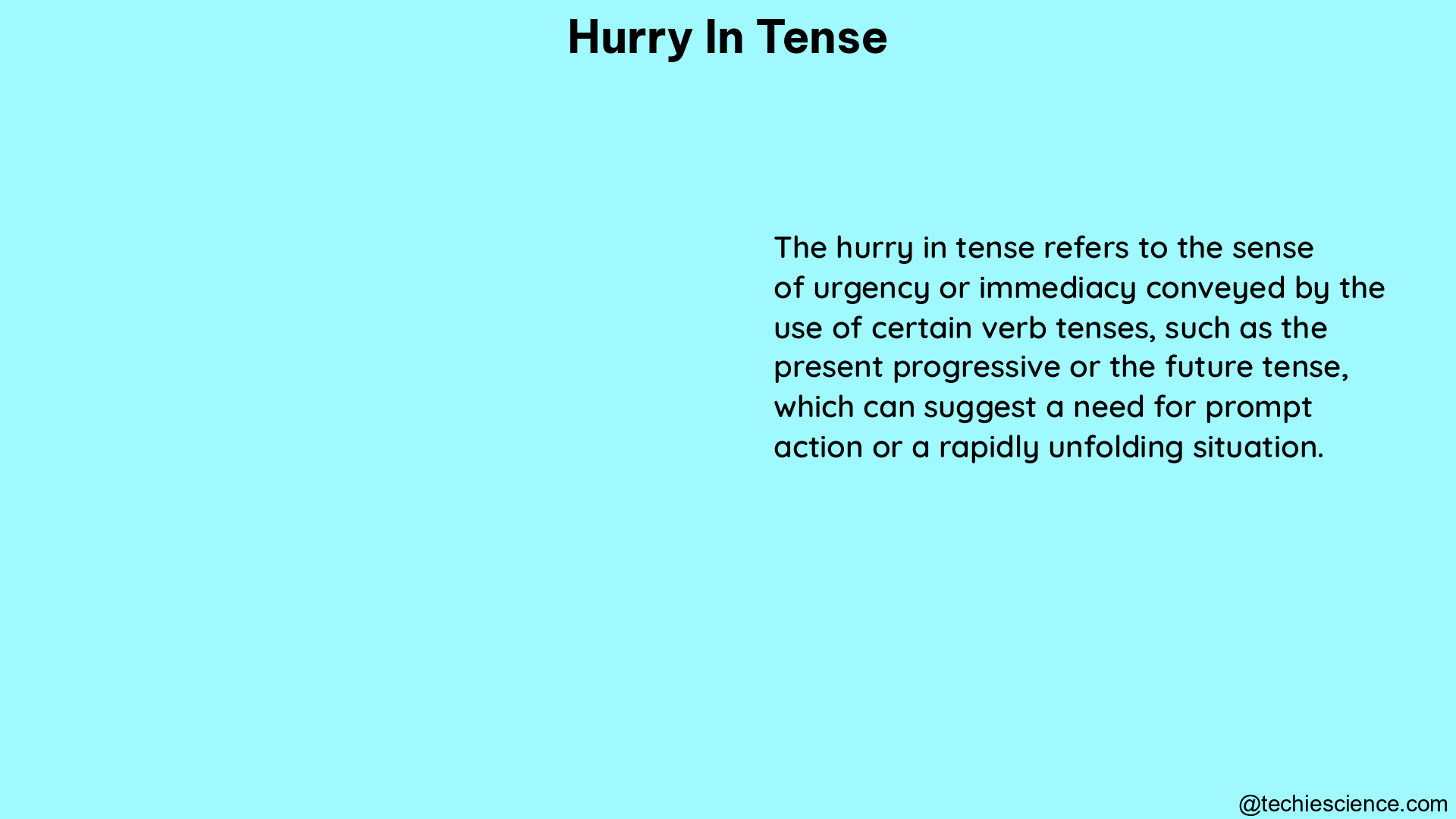The verb “hurry” is a common and versatile word in the English language, used to convey a sense of urgency, speed, or haste. Mastering the conjugation and proper usage of “hurry” across various tenses is essential for effective communication and writing. In this comprehensive guide, we will delve into the intricate details of the verb “hurry,” exploring its conjugation patterns, grammatical specifications, and practical examples to help you become a proficient user of this dynamic verb.
Indicative Tenses
Present Simple
The present simple tense of “hurry” is used to express habitual or general actions. The conjugation is as follows:
- I hurry
- You hurry
- He/She/It hurries
- We hurry
- You hurry
- They hurry
Example: “I hurry to catch the bus every morning.”
Present Continuous
The present continuous tense of “hurry” is used to express an ongoing action happening at the present moment. The conjugation is as follows:
- I am hurrying
- You are hurrying
- He/She/It is hurrying
- We are hurrying
- You are hurrying
- They are hurrying
Example: “I am hurrying to finish my project before the deadline.”
Present Perfect
The present perfect tense of “hurry” is used to express an action that has been completed in the past but has relevance to the present. The conjugation is as follows:
- I have hurried
- You have hurried
- He/She/It has hurried
- We have hurried
- You have hurried
- They have hurried
Example: “I have hurried to the store several times this week.”
Present Perfect Continuous
The present perfect continuous tense of “hurry” is used to express an ongoing action that has been in progress for some time and is still continuing. The conjugation is as follows:
- I have been hurrying
- You have been hurrying
- He/She/It has been hurrying
- We have been hurrying
- You have been hurrying
- They have been hurrying
Example: “I have been hurrying to finish my work all day.”
Past Simple
The past simple tense of “hurry” is used to express a completed action in the past. The conjugation is as follows:
- I hurried
- You hurried
- He/She/It hurried
- We hurried
- You hurried
- They hurried
Example: “I hurried to the airport to catch my flight.”
Past Continuous
The past continuous tense of “hurry” is used to express an ongoing action in the past. The conjugation is as follows:
- I was hurrying
- You were hurrying
- He/She/It was hurrying
- We were hurrying
- You were hurrying
- They were hurrying
Example: “I was hurrying to finish my homework when the power went out.”
Past Perfect
The past perfect tense of “hurry” is used to express an action that was completed before another past action or a specific time in the past. The conjugation is as follows:
- I had hurried
- You had hurried
- He/She/It had hurried
- We had hurried
- You had hurried
- They had hurried
Example: “I had hurried to the store before it closed.”
Past Perfect Continuous
The past perfect continuous tense of “hurry” is used to express an ongoing action that was in progress before another past action or a specific time in the past. The conjugation is as follows:
- I had been hurrying
- You had been hurrying
- He/She/It had been hurrying
- We had been hurrying
- You had been hurrying
- They had been hurrying
Example: “I had been hurrying to finish my project for hours before I finally completed it.”
Other Forms

Modal Verbs
Modal verbs can be used with the verb “hurry” to express various degrees of possibility, necessity, or obligation. Here are some examples:
- Can hurry
- Could hurry
- May hurry
- Might hurry
- Shall hurry
- Should hurry
- Will hurry
- Would hurry
- Must hurry
- Ought to hurry
Example: “You must hurry to catch the bus.”
Imperative
The imperative form of “hurry” is used to give a direct command or instruction. The conjugation is as follows:
- Hurry (singular)
- Hurry (plural)
Example: “Hurry up, we’re running late!”
Examples and Usage
Here are some additional examples showcasing the usage of the verb “hurry” in different tenses and contexts:
- “She hurried away without saying goodbye.” (Simple Past)
- “He is hurrying to finish his project.” (Present Continuous)
- “They have hurried to the store several times this week.” (Present Perfect)
- “I had hurried to the airport to catch my flight.” (Past Perfect)
- “Don’t hurry me; let me think.” (Imperative)
References
- Collins Dictionary. (n.d.). HURRY conjugation table. Retrieved from https://www.collinsdictionary.com/us/conjugation/english/hurry
- Bab.la. (n.d.). How to conjugate “to hurry” in English. Retrieved from https://en.bab.la/conjugation/english/hurry
- The Conjugator. (n.d.). English verb conjugation TO HURRY. Retrieved from https://www.theconjugator.com/english/verb/to%2Bhurry.html
These resources provide detailed conjugation tables and examples for the verb “hurry” in various tenses and forms, helping English students master its usage.

Hi…. I am Goutam Datta. I have completed a double M. A. in English and B. Ed. I am a creative writer. Currently, I am a part of the LambdaGeeks.